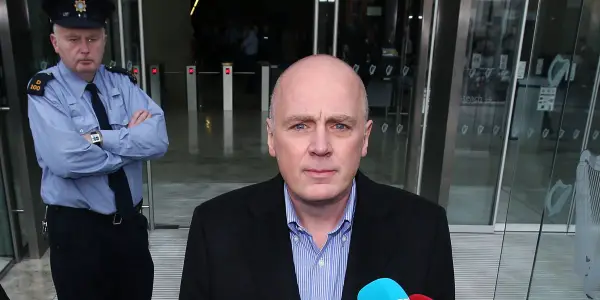Former Anglo Irish Bank boss David Drumm has walked free from custody for the first time in five months after securing bail in Ireland when his parents-in-law stumped up 100,000 euro.
The ex-banker, charged with 33 fraud-related offences linked to his running of the doomed lender, blew a kiss to his family in court when his release was granted, a day after his extradition back to Dublin from the US.
The 49-year-old later quietly hugged supporters inside the vast foyer of the Irish capital’s Courts of Criminal Justice, before being forced to run the gauntlet of a phalanx of reporters and photographers outside.
On his first steps to limited freedom, under strict bail conditions ahead of his trial, Drumm stopped for about 20 seconds outside the courts complex to pose for pictures but refused to answer any questions or make any comment.
He was then ushered into a waiting black Volkswagen Passat and taken away from the city centre.
Drumm spent his first night back in Ireland on Monday in prison, as the paperwork for his release had not been finalised.
During brief hearings on Tuesday at Dublin’s District Court, parents-in-law Danny and Georgina Farrell both agreed to a 100,000 euro independent surety from their joint bank account to satisfy the bail conditions.
Half of the cash has to be handed to the court with the other half frozen in their bank account.
Both were warned by Judge Michael Walsh that they should track their son-in-law’s movements and contact police immediately if they have any concerns about his whereabouts.
They were also asked to confirm they knew about his bankruptcy proceedings in the US.
Dressed in a black overcoat, dark trousers and open-necked blue shirt, Drumm was asked if he was going to comply with his strict bail conditions, which include the forfeiture of his passport and having to sign on at a police station twice a day.
“I will your honour,” he said.
The father of two daughters also has to provide his own cash surety of 50,000 euro.
He will live at Shenick Avenue in Skerries, Co Dublin, as he awaits his trial.
Judge Walsh ordered him to give a mobile telephone number to gardai, on which he is always contactable.
As part of his ban on leaving the State, he was warned this meant no trips across the border to Northern Ireland.
His case was put back for mention again at Dublin Circuit Criminal Court on April 8.
The one-time chief executive of Anglo Irish Bank left Ireland for Boston in 2009 after the lender collapsed, costing Irish citizens 29 billion euro.
It is not expected he will stand trial for at least two years.
Drumm is charged with conspiracy to defraud and false accounting relating to 7.2 billion euro deposits placed in Anglo accounts by the then Irish Life and Permanent between March and September 2008.
He faces a maximum sentence of an unlimited jail term if convicted of the conspiracy charge.
Drumm is also charged under the Companies Act over alleged unlawful lending to members of the Quinn family and the so-called Maple 10 investors to unwind a secret 28% shareholding in Anglo built up by tycoon Sean Quinn.
Those 16 charges could lead to a maximum sentence of five years in jail.
Drumm is also charged with seven offences under the Companies Act of being privy to falsifying documents which could lead to a maximum five years in jail if convicted, and seven offences of creating false documents under the Criminal Justice (Theft and Fraud) Offences Act which could lead to a maximum of 10 years in jail if found guilty.
He is further charged with breaching European rules on making company reports.
The court heard he has 8.5 million euro of debts.
Lawyers for the Director of Public Prosecutions had objected to bail but Judge Walsh rejected their claims he was a flight risk.
The former banker’s wife Lorraine is putting the family home in Massachusetts up for sale and she is expected to return to Ireland with one of his daughters in late June after she has finished school, the court was told.
The trial will involve 120 witnesses and minutes from up to 15 company meetings.
Ireland’s fraud squad and the corporate watchdog in the Office of the Director of Corporate Enforcement launched inquiries into the bank’s collapse seven years ago.
